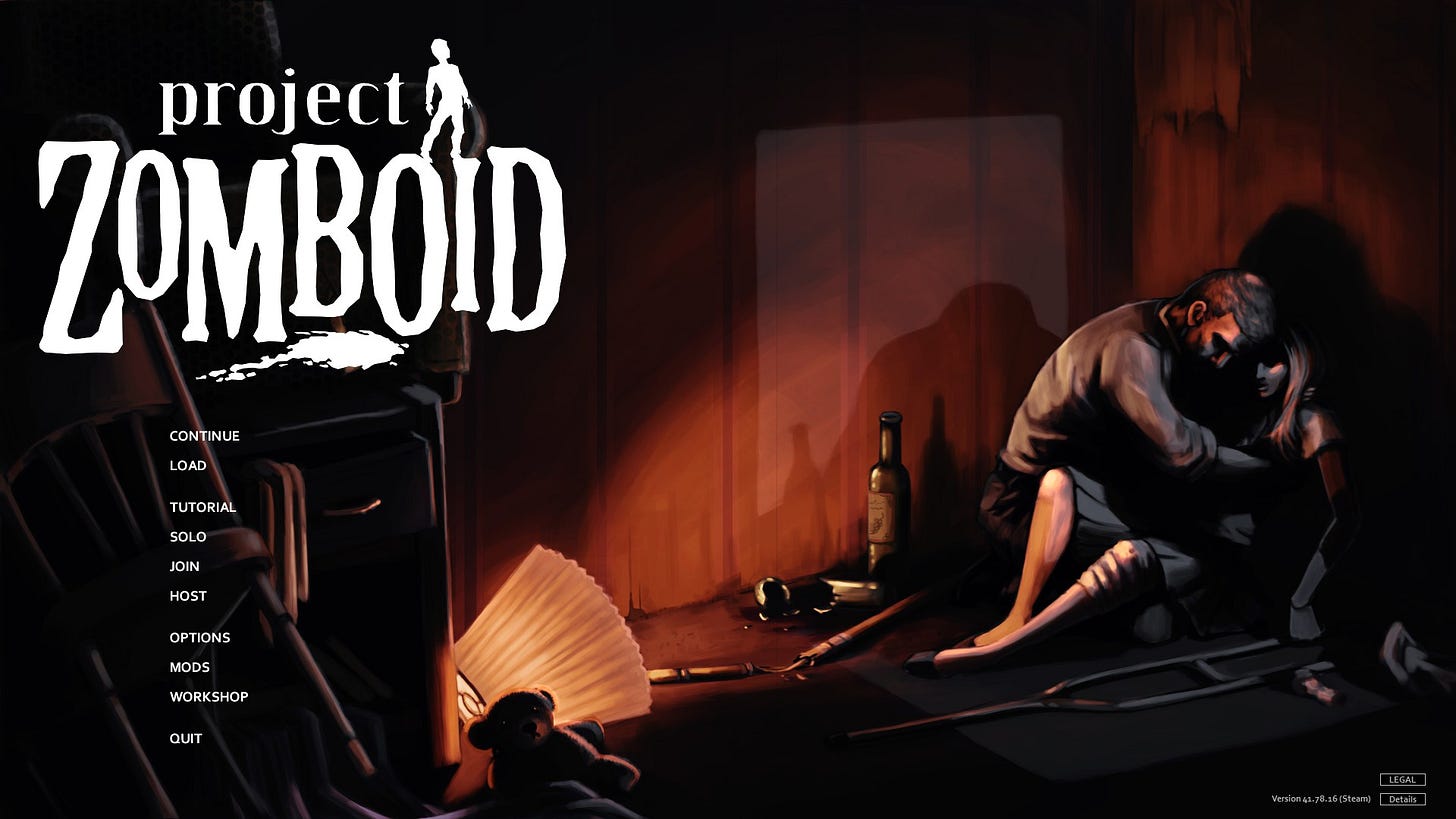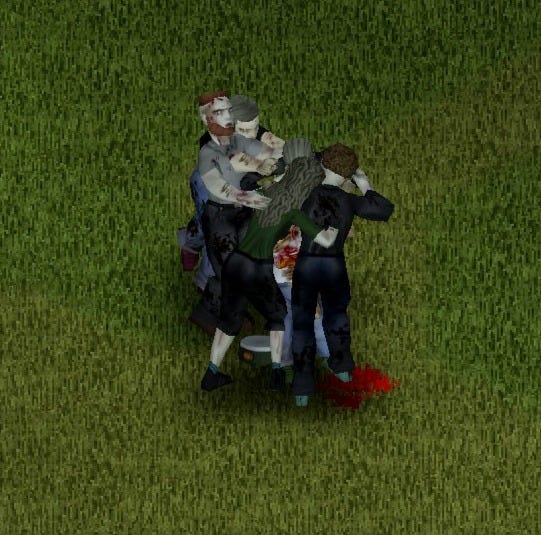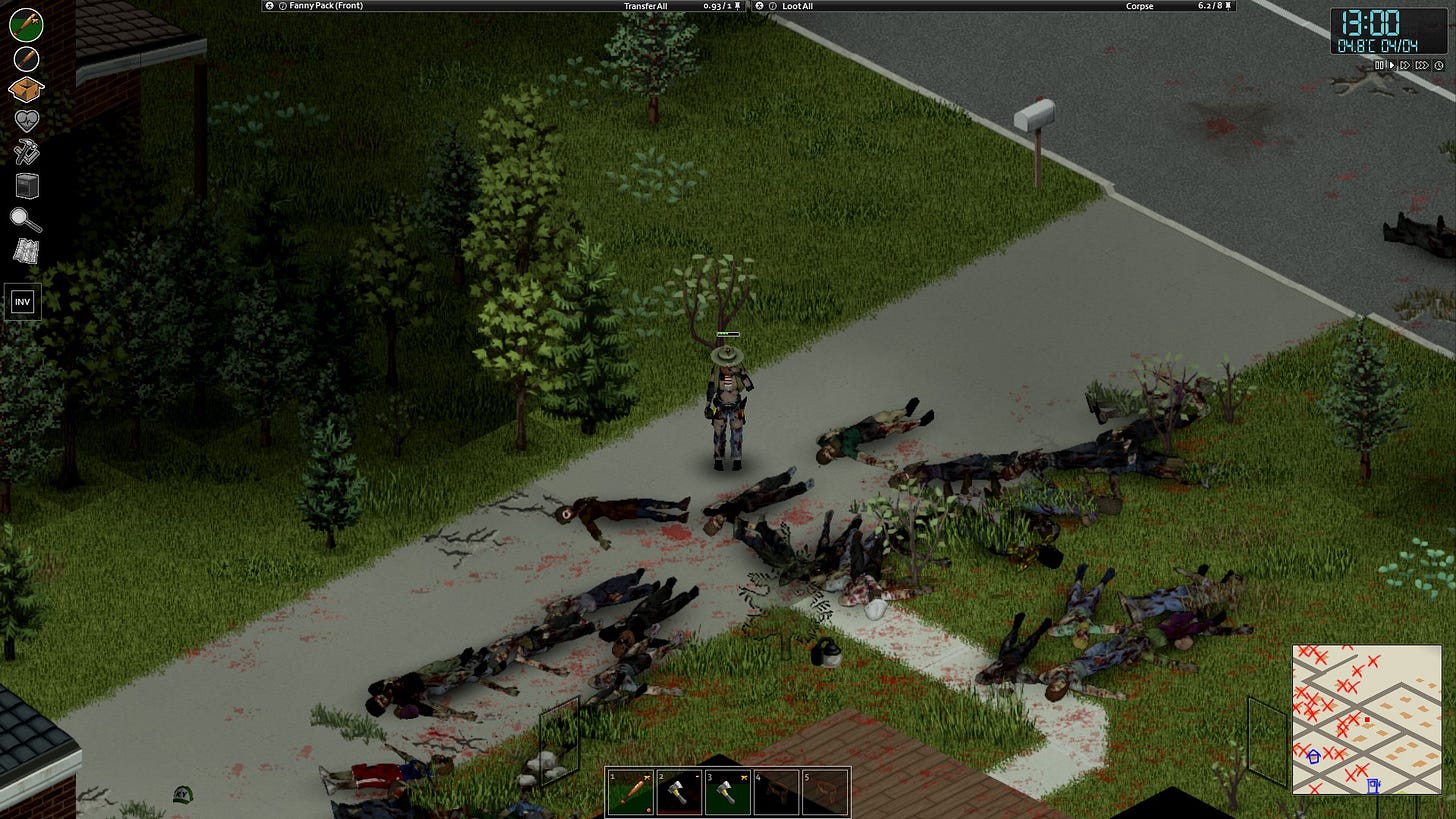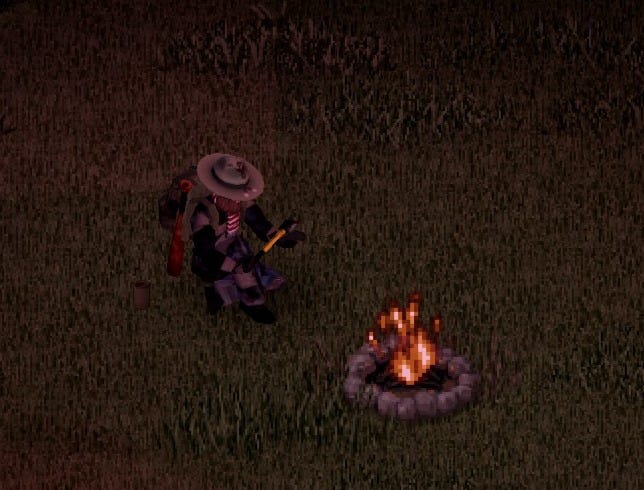Project Zomboid and the Peril of Endless Games
How a lack of player goals could make them lose interest
An Introduction
Hey, everyone! This is the first entry in my new series Dissecting Game Design, where I discuss videogames and attempt to focus on specific game design aspects I find interesting and worth discussing. I am not an expert on game design by any means, so take my opinion as just that - an opinion. This is by no means a review. Even if it were, I think reviews should be about engaging with art through different perspectives instead of attempting to assign a concrete value on it. Please approach this as a discussion in which I try to figure out why I think something works (or doesn’t work) from my subjective game design perspective.
I’m a game developer myself (although my games are way shorter and often web entries instead of Steam games - for now!), and I think doing this sort of critical analysis is an invaluable tool, as it improves the design of your own games, opens up your mind to think in new ways, as well as allowing you to communicate complex ideas more effectively. So, ultimately, this is just an exercise for myself that I’ve decided to make public, in case anyone finds it interesting or helpful.
Project Zomboid - a Harrowing and Fun Survival Experience
Let me get this out of the way first - I love Project Zomboid, and recommend it wholeheartedly (I even got a bunch of my friends to buy it). I’ve played around 320 hours at the time of writing. I’ve lost a lot of characters and created even more. Even though this game is immensely punishing and frustrating - as anyone who has gotten an unlucky, game ending infection from an unexpected scratch will tell you -, it also pushes you to learn more and become better so that you’ll survive longer on your next run. Unfortunately, this is, in my opinion, also the game’s biggest downfall.
Right from the start, Project Zomboid makes sure you understand that this isn’t a game you can win. Whenever you load up a game, some text will show up to inform you that this is the story of how you died. Even the tutorial rubs this in by tricking new players into pressing the shout button so that they attract a horde of zombies, and can only ever be completed by dying. The game is fully aware that it is, for all intents and purposes, an “endless” survival game, and relishes in the sense of freedom such a setting offers.
The effect is downright magical when you’re on your first few playthroughs. You spawn in a dimly lit room by yourself with pretty much nothing on you but your clothes. You rummage around to find weapons, food, water, whatever you can get your hands on. You feel some sense of (ill-advised) security when you obtain a kitchen knife, but quickly realize how useless and sluggish you feel in combat. You panic, run out of the house, and encounter a horde of zombies that start slowly chasing you. Eventually, your character becomes so tired that they’re slowed down to a crawl, you trip over a fence, and your run ends unceremoniously with some drowned out screams of agony and a cacophony of gross gory sounds. Well, maybe next run will go better. Maybe you can avoid alerting as many zombies by crouching instead?
This is how the fundamental Project Zomboid experience goes. You play for a bit, make a mistake you can’t recover from, die, learn something new, and try again. It is beautifully effective at teaching the player through organic gameplay and conveying their progress and skill back to them. You feel a sense of accomplishment when you survive for a day, then a week, then a month. You feel like you’ve learned when you find your first usable car, when you find and fix your first generator, when you find renewable ways to produce water and make your base sustainable. You feel like a survivor genius when you survive the first dreaded helicopter event. Everything in this game makes you feel like you’re growing and improving, as every small thing feels like a tiny victory in the battle for survival.
So if it all works so well, what’s the issue?
Eventually, players learn enough that they avoid making mistakes as much. One of my lost characters, a mechanic who specialized in blunt weapons, died from a jump-scare-neck-bite from a zombie I didn’t see approaching while I was working on fixing a car. From then onwards, I always checked behind me every couple of seconds and never died again while doing crafting tasks. Another one died because I fought too aggressively and became exhausted, blocking my ability to run to safety. From then on, I became more aware of my tiredness and rested whenever I had the chance (click on “Rest” whenever you see furniture - it’s invaluable). No more deaths from over exhaustion. A particularly unlucky one opened a door to a restroom and got infected by a sneaky zombie. After that, I took a couple of steps back whenever I opened a door, and the dreaded ninja zombies weren’t a threat anymore.
All of the things the game challenges the player to do, and then rewards them for solving, are the main hurdles that holds the player’s interest. While the first few playthroughs are terrifying because of the amazing ambience, sound design, sparse music, and darkly lit rooms, as with all things horror, you eventually become used to it. Zombies become less of a scary threat, and more annoyances that stop you from doing what you want quickly. After that, the game keeps you invested because of its immediate challenges. Finding some skill books, having enough food and water, finding a usable car and a defendable base - all of those things present clear short and medium term goals that the player has to accomplish. But what’s really left once you’ve found a stable footing and your character is not in constant danger anymore?
At this point, you might want to start trying out some alternative ways to play or challenge runs. Maybe you play a lumberjack who wants to build his own cabin in the woods, or an underweight cook who only uses bladed weapons, or maybe even a fisherman who does nothing but survive on the riverside. While Project Zomboid offers a wide array of skills and ways to play, none of them are deep enough that they change the fundamental experience of the game.
The player has now pretty much “solved” the game. They may try new challenge runs, download some new mods, or turn up the difficulty settings, but that feeling of meaningful progression is no longer there. The early game (arguably the most enjoyable part of a playthrough), the period where you’re trying to get a stable footing by finding a couple of good weapons, a base, and some food, is now more of a checklist of items the player needs to find, and with every subsequent run becomes shorter and shorter. The player will reach the plateau of safety (and then, staleness) faster the better they become at the game.
While Project Zomboid does a masterful job of teaching and reinforcing various mechanics through organic gameplay, it then becomes a bit of a letdown because there is nothing to up the ante to match the player’s improved skillset. There’s no explicit reward for being good (other than more chances at better items and a stronger character), because, at the end of the day, the only way to truly finish the game is to die.
So what can be done?
I don’t think there’s anything wrong with designing games this way, so I don’t think there’s anything that should be done. I’ve played for 320 hours - clearly the design of the game works very well. However, I think it’s important to be aware of this issue, which I think is one of the perils of making endless games: if the reward for playing your game is more of the same game, then you might lose players along the way.
At this point, I play on some pretty high difficulty settings. It’s gotten to the point where playing with my friends is difficult, because they find my settings unfun and I find anything lower boring. I don’t intend to hype myself up as some sort of Project Zomboid master - I genuinely think this is the natural consequence of the game’s structure. If the game’s enjoyment comes mostly from overcoming the game’s difficulty (because there is no overarching goal), then the player will want more difficulty to get the same sense of enjoyment as they become more skilled.
The folks at The Indie Stone (the developers) seem to have set out to make a game where you’re wholly insignificant in the grand scheme of things. You aren’t a hero sent in to clear the zombie horde and save civilians, nor a scientist devoted to finding a cure. You are, quite literally, a regular joe who happens to be alive out of luck, and you’re intended to get by suckling nutrition out of rotting mice carcasses. The only accounted-for ending for your character is their death. In terms of the intended player experience, the developers hit the nail on the head a billion times over, since the game is very well designed around this idea.
Personally, I just don’t find this very appealing. Once I realized the answer to the game’s question of “how long can you survive?” was “for a pretty long while!”, I stopped getting a lot of enjoyment. I’m the sort of player who likes getting deeply invested in the various mechanics of a game to overcome some sort of challenge, but, when the reward for doing so is just more of the same game but with less challenge, there’s not much left in it for me.
An example of this is the skill progression system. At the start of the game, you’re not that great at a lot of things. Take melee combat, for instance - you do pitiful damage and the best way of killing zombies is by stepping on them after shoving them. While it does feel good to become stronger, and you’re able to steadily take on larger groups of zombies at once, it’s difficult to shake the feeling that there’s no real reason to be taking on larger groups of zombies in the first place. This results in melee combat level ups feeling satisfying in an immediate but ultimately fleeting way, since you’ve just made your character better at reaching the point of safety and staleness.
In my opinion, the game would work a bit better if there was something more meaningful to work towards. It would feel a lot better to grind experience points in different stats if you were preparing yourself to face an ultimate challenge of sorts. Maybe you could find a way to escape and “win” the game by finding a series of messages from the army, or maybe you could find a way to establish contact with some scientist who’s working on a cure (even if he’s ultimately unsuccessful). It would make a lot more sense to stockpile weapons and ammo if you knew, eventually, you’d have to use any of it for a reason. Even if these options are corny or trite, my point is that giving the player goals allows them to feel a sense of purpose in the various mechanics of the game that is, in my opinion, not there in the game’s current iteration.
In conclusion, I think games work best when they offer you something to work towards. Tripping and getting back up feel a lot better when you’re running towards a finish line. Otherwise, you’re just tripping. However, I understand that this would probably run contrary to the game’s design philosophy, and there’s definitely something to be said about that. While I love Project Zomboid and wish I could continue to enjoy it, I feel like at some point I inadvertently and unceremoniously “solved” the game, and now there’s not much of a reason for me to come back.






Some games maybe don’t think of the “completionist player” and others do to the extreme. Quite a hard thing to balance!